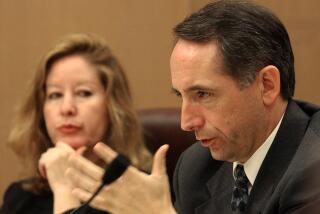Judge Orders Removal of PUC Member
- Share via
SAN FRANCISCO — A judge ruled Thursday that Henry M. Duque, the lone Republican on the California Public Utilities Commission, should be removed from office because he violated conflict-of-interest laws by buying stock in a telecommunications company regulated by the commission.
San Francisco Superior Court Judge Alfred Chiantelli also fined Duque $5,000 and ordered him to pay court costs and attorney’s fees for a consumer group that sued to strip Duque of his $107,000-a-year job.
The judge gave Duque 10 days to voice any objections before the ruling becomes final.
Through his attorney, Duque said he would challenge the ruling if it becomes final and will seek permission to stay in office during the appeal. His term expires on Jan. 1.
Duque, a seven-year veteran of the PUC, invested $10,000 in 1999 in Nextel Communications, a mobile phone company that sometimes has business before the panel. Duque reported the investment on financial disclosure statements filed with the state. Then in August 2000--two days after a San Francisco Chronicle reporter inquired about the stock--he disposed of the stock.
With the official blessing of the state attorney general, the Foundation for Taxpayer and Consumer Rights later in 2000 sued Duque on behalf of the public. During a one-day trial in December, Duque said he relied on the assurances of his stockbroker that Nextel was regulated by the federal government, not the PUC, and was not aware of the company’s business before the commission.
“I told [my broker] I could not and would not own stock in companies we regulated,” Duque testified. He said he provided no list of companies the PUC regulated because there was none.
However, the judge’s ruling said, “Reliance on his stockbroker is insufficient ... because Duque had a duty to keep himself informed of his investments so that he would not be in conflict with his position of trust. His failure to fulfill this duty should not serve as a defense, otherwise the law would encourage willful blindness.
“This court does not find that Duque is dishonest,” Chiantelli added. “This is not a case of bad faith but bad judgment.”
The judge specifically faulted Duque for failing to seek a definitive legal opinion on whether Nextel was regulated by the PUC, especially after the commission in February 2000 issued notice that it was establishing consumer protection rules that would apply to all telecommunications companies.
Joseph Remcho, who is representing Duque, said Duque is disappointed with the ruling but gratified that the judge did not conclude he was deliberately violating any law.
“In our view, the law provides no penalty for innocently holding the stock, let alone the harsh remedy of exclusion from office,” Remcho said in a statement.
Pamela Pressley, attorney for the Foundation for Taxpayer and Consumer Rights in Santa Monica, said, “This is a big victory for the public’s interest in having public officials stay completely free of financial conflicts. As PUC commissioners, they have to decide major issues that affect these companies. Ultimately it may seem harsh, but that is reality.”
Although the lawsuit contended that Duque’s office was vacated the moment he purchased Nextel stock, Pressley said there is no legal provision to erase the hundreds of votes he has cast since then.
The PUC regulates not only retail natural gas and electricity rates but also many matters that affect wireless phone companies, including area codes and agreements with wired phone companies.
The judge noted that there were five instances in which issues related to Nextel or wireless carriers arose at the PUC. In March 2000, for example, Duque voted for an interconnection agreement between Pacific Bell and Nextel as a consent-agenda item approved en masse by the five commissioners. In November 1999, Duque voted against Nextel’s interests after wireless carriers filed petitions for the allocation of phone codes in the 310 area code.
Atty. Gen. Bill Lockyer gave the foundation permission in November 2000 to pursue Duque’s removal from office on behalf of the people of the state. Lockyer spokeswoman Sandra Michioku said Thursday, “The judge has affirmed what we would come to expect--that a PUC commissioner would be sure to avoid a financial conflict of interest--and the Constitution clearly says you can’t have one and be a commissioner.”
Last month, Republican Richard Bilas resigned from the PUC for health reasons and out of frustration with commission policies. That left Duque, a former banking executive who was appointed in 1995 by Gov. Pete Wilson, as the last GOP commissioner. He and Bilas often were on the losing end of 3-2 votes.
More to Read
Sign up for Essential California
The most important California stories and recommendations in your inbox every morning.
You may occasionally receive promotional content from the Los Angeles Times.













